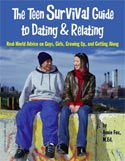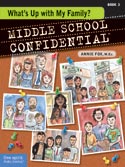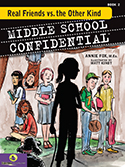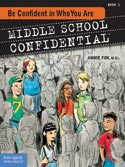In the Media
Scourge of the Mean Girls
Experts fear epidemic of witchlike,
bullying behavior in schools
Reprinted from the New York Daily News, December 9, 2006
Twelve-year-old Brooke goes to a swanky Manhattan private school every day panic- stricken. "I am always afraid I'm wearing the wrong thing, and one of them will make a big deal out of it in front of the entire class and I will be, like, destroyed."
The "them" she refers to is a clique of popular girls who make a point of belittling, berating and bullying her as well as a few other kids. Brooke is exactly the type they love to target. She's shy, insecure, on partial financial assistance and can't compete. Her closet isn't filled with designer labels ("I only own like one or two Juicy clothes my mom got me on sale, and they know it"); she isn't allowed to go on dates yet; she doesn't own a Sidekick or a cell phone.
"Sometimes they make fun of me," she admits. And the taunts and teases clearly hurt and haunt her. "Once, this popular girl said I looked like I was on stamps," the preteen adds. "She E-mailed it around. I had to go home and ask my mom what that meant. She said it meant food stamps, and that we were poor."
These Mean Girls, just like the characters in the 2004 hit film starring Lindsay Lohan, are adept at insults. Some use text messaging, online blogs (such as MySpace) and even personal ads to get their message across. "It can get pretty cruel and heartless," says Annie Fox, online adviser (www.anniefox.com) and author of "The Teen Survival Guide to Dating & Relating."
Parents and educators fear "mean girl syndrome" is reaching epidemic proportions in local schools. "I can't stand how fearful my daughter is of 'not fitting in,'" says one Bronx mom. "I encourage her to be strong but all she worries about is what the other girls will think. And I'm afraid of what she'll do to simply be one of the pack – drugs, drinking, sex, who knows?"
What makes a mean girl tick? A mean girl is insecure herself, Fox explains, and she'll do whatever it takes to make herself feel bigger and better than the rest. This type of behavior even has a fancy name among psychologists: relational aggression (RA), and it comes in lots of different forms: a nasty remark, a cruel laugh, total ostracism. Two or three close friends form a clique to consolidate power. This inner circle appears to "have everything" in the eyes of others. "If their lives were all that perfect, they wouldn't need to make others miserable," Fox adds.
The most amazing thing is that these mean-girl cliques don't just form in junior high or high school. A 2005 study by Brigham Young University revealed that girls as young as 3 or 4 will use manipulation and peer pressure to get what they want. The research found that about 17% to 20% of preschool and school-age girls display such behavior.
5 tips for coping with a clique
Here's what you should know about dealing with nasty classmates:
- Remember this is NOT your fault. You haven't done anything to deserve this kind of meanness.
- You are not alone. Lots of kids have to deal with this every day.
- Don't suffer in silence. Talk to someone (preferably an adult at the school and/or your parent).
- Find at least one friend whom you can trust.
- Do NOT try to retaliate. Meanness only turns into more meanness.
















